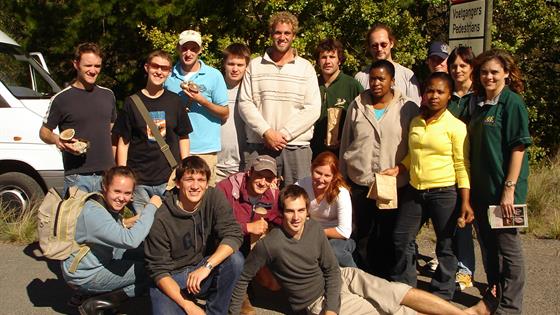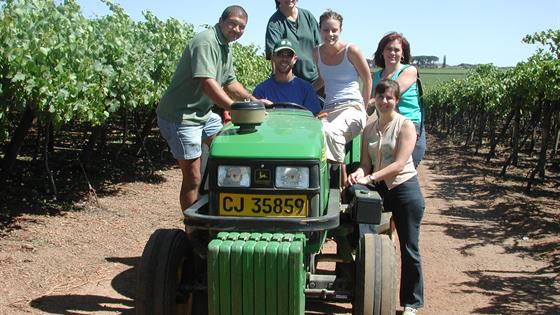





A Typical Plant Pathology student!
Loves nature, especially plants
Enjoy laboratory and field
work
Eye for detail
Inquisitive
Accurate, tidy
Patient,
persistent
Hard working (seasonal work)
Good communication and writing
skills
Admission requirements
Basic admission requirements for university study:
- A National Senior Certificate (NSC) or Independent Examinations Board (IEB) school-leaving certificate as certified by Umalusi with admission to bachelor's degree studies.
- A university exemption certificate issued by the South African Matriculation Board to students with other school qualifications.
- The minimum academic requirement for a bachelor's degree is:
- 30% for a South African Language of Learning and Teaching (English or Afrikaans) and
- An achievement rating of 4 (50% - 59%) in four 20-credit subjects
- Only School of Tomorrow applicants have to write the National Benchmark Tests (NBTs) if applying for a programme in AgriSciences.
Faculty requirements for BScAgric Plant and Soil Sciences with Plant Pathology as a major
- An average of at least 60% in the NSC, IEB or relevant final school examination.
The average is calculated by taking your highest score in Language of Learning and Teaching subject (English or Afrikaans) + (5 x best results in 20-credit subjects excluding Life orientation and Mathematics 3). The total divided by 6 equals your NSC average.
- Afrikaans or English (Home Language or First Additional Language) 4 (50%)
- Mathematics 5 (60%)
- Physical Sciences (Physics and Chemistry) 4 (50%)
Take note:
- All programmes are selection programmes and applications will be considered according to the rules and procedures as set out in the Selection guidelines and admission policy for undergraduate programmes for the Faculty of AgriSciences. For full detail, visit:
http://www.sun.ac.za/english/maties/Documents/AgriSciences.pdf
For more information regarding admission requirements, contact:
Monika Basson
Tel: +27 (0)21 808 2978
Fax: +27 (0)21 808 2001
E-mail: mh@sun.ac.za
 Faculty of AgriSciences Programme Information and Admission Requirements
Faculty of AgriSciences Programme Information and Admission Requirements
 Selection guidelines and admission policy
Selection guidelines and admission policy
Programme
First
year: Follows the Biological Sciences programme
(Faculty of Science)
Second Year: Follows the Plant and Soil Sciences
Programme
(Study fields: Crop Production / Crop Protection
and Breeding / Soil and Water Management) (Faculty of AgriSciences)
Third and Fourth Year: Choose Plant Pathology as major
subject:
Modules
Crop Protection 152 - Introduction to plant protection and improvement
Introduction
to the disciplines of plant breeding, plant pathology, entomology, nematology
and weed science. Case studies of plant pests, diseases and weeds that have
shaped the history of the world and influenced food security. The basic
principles of plant improvement for pest and disease management.
Crop Protection 244 - Introductory Plant Pathology and
Entomology
The nature and causes of plant diseases, the impact of
pathogens and pests on agriculture, the biology of important pathogens and
pests, factors influencing disease development, diagnosis of plant diseases and
principles of plant disease control.
Flexible assessment
Plant Pathology 314 - Plant disease management
The
underlying principles and methods used for plant disease control from
pre-planting to post-harvest. This includes the role of plant quarantine,
disease certification and cultivation practices on disease development, and on
the epidemiological considerations for plant disease forecasting and disease
assessment. Emphasis is placed on plant disease resistance, and chemical and
biological control, either as primary control strategies or as components of an
integrated disease control programme, to ensure efficient and sustainable
protection against a diverse range of pathogens.
Plant Pathology 344 - Plant disease dynamics
Components
of plant diseases, such as the plant pathogens that cause them, the host factors
that influence their development, and the environmental conditions that favour
them. Diseases of national and international importance and the damage they have
caused to food production in the world. The dynamics of pathogens associated
with seed and nursery plants, as well as those causing soil-borne, foliar and
fruit diseases before harvest, and decay and damage after harvest.
Plant Pathology 414 - Taxonomy and biology of plant
pathogens
Morphology, taxonomy and biology of plant pathogenic
fungi, oomycetes, bacteria, mollicutes (spiroplasmas and phytopasmas) and
viruses. Practicals include microscopic cultural morphology, and physiological
and biochemical methods used to identify the major groups of plant pathogenic
fungi, oomycetes and bacteria.
PP Plant Pathology 314, 344
Plant Pathology 444 - Plant-microbe interactions
The
dynamic interaction between plants and microorganisms, both detrimental and
beneficial. Aspects related to fungal diversity, genetics and genomics; and the
role of microbial pathogenicity factors and secondary metabolites in plant
disease development. The plant’s defence mechanisms and ability to recognise and
respond to pathogen attack. Enhancement of disease resistance in plants against
pathogens, and the development of novel disease control strategies. Methods used
for gene discovery and functional gene analyses in plants and pathogens, and
concepts such as transformation and gene manipulation.
PP Plant
Pathology 314, 344
Plant Pathology 474 - Advanced plant pathology
Topical issues in plant pathology, including new approaches for the management of plant diseases. Emphasis is placed on postharvest and soilborne diseases, and the use of pesticide spray technology for improving plant disease control of foliar and fruit disease in an environmentally safe manner. Aspects related to the sustainable production of plant-based foods, including phytosanitary issues, pesticide residues and microbial contaminants of plant-based food crops. Visits to key agricultural industries in order to obtain a practical understanding of the role of plant pathology in agriculture. Attendance of postgraduate research seminars.
Crop Production 478 - Advanced Crop Production
Practically orientated crop production related field and/or laboratory investigations using relevant and current experimental approaches and methods of analysis, while addressing topical issues in crop production systems related to food security and environmental challenges. Specialization in one of the following disciplines: Agricultural Economics; Agronomy; Entomology & Nematology; Genetics; Grapevine Sciences; Horticultural Sciences; Plant Pathology or Soil Science.
Career opportunities
in Plant Pathology!
Researcher (e.g. ARC, Department of
Agriculture, CRI, Experico)
Academic (Universities)
Consultant (e.g.
Hygrotech, Merck, Kapa Biosystems, private)
Technician (e.g. Hygrotech,
Merck, Kapa Biosystems, private)
Agri-businesses (e.g.
Hygrotech)
Agri-chemical companies (e.g. Bayer, Du Pont, Philagro,
BASF)
Diagnostic Clinics (e.g. US Disease Clinic, Nemlab,
private)
Skills to work in related fields (Botany, Microbiology,
Horticulture)
High Flyers from our
department!
Prof PW Crous (Director of the Centraalbureau voor
Schimmelcultures at Utrecht, Netherlands)
BSc
Forestry (1985), Stellenbosch University, Stellenbosch, South Africa
MScAgric
(cum laude) (1988), Stellenbosch University, Stellenbosch, South
Africa
PhD(Agric) (1992), University of the Orange Free State,
Bloemfontein, South Africa
Prof MJ Wingfield (Director of the Forestry and Agricultural
Biotechnology Institute (FABI), Faculty of Biological and Agricultural Sciences,
University of Pretoria, South Africa)
BSc (1976), University of Natal, KwaZulu Natal, South Africa
BScHons
(1977), University of Natal, KwaZulu Natal, South Africa
MSc (cum
laude) (1979), Stellenbosch University, Stellenbosch, South
Africa
PhD (Plant Pathology and Entomology) (1983), University of
Minnesota, USA

